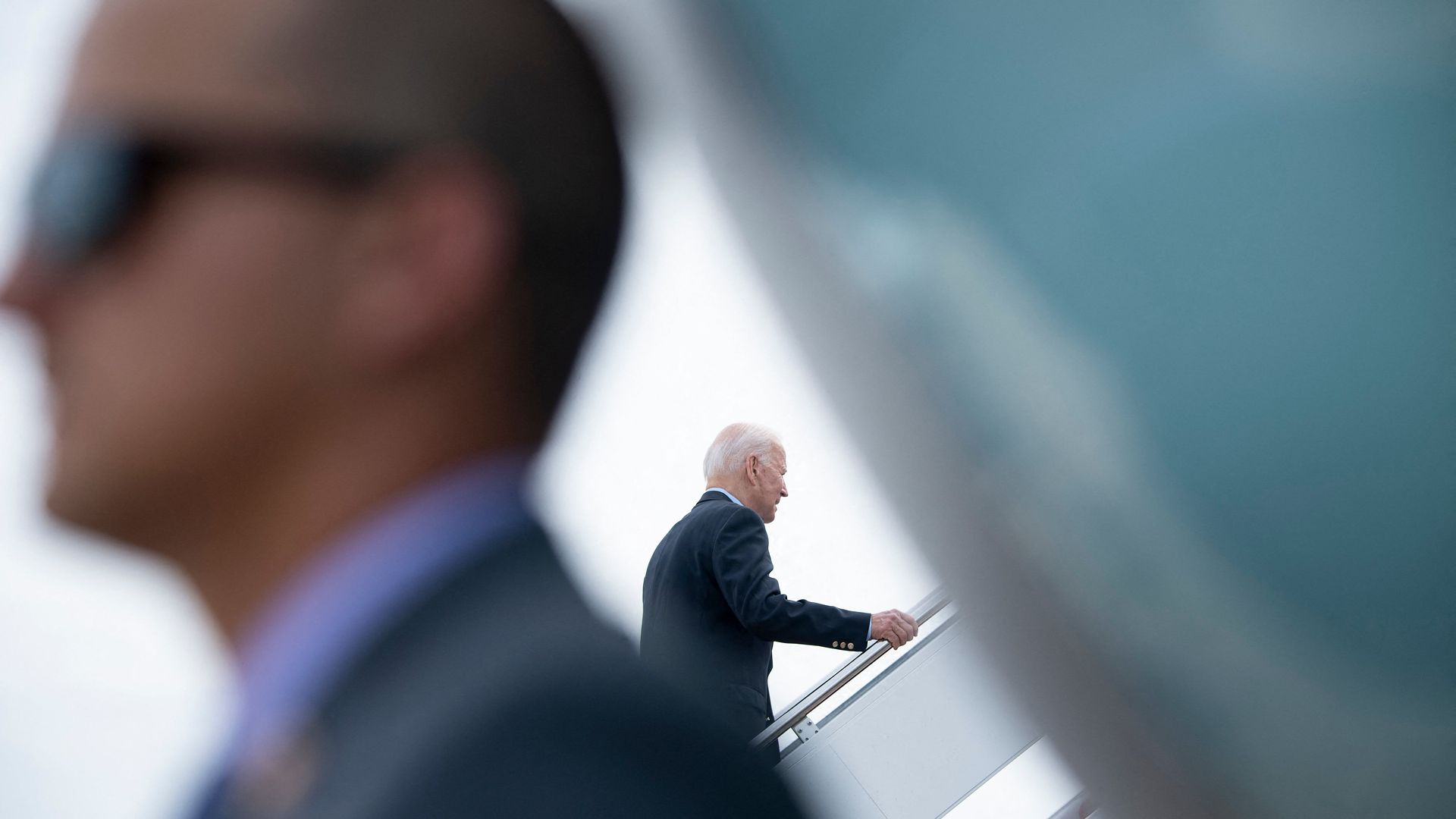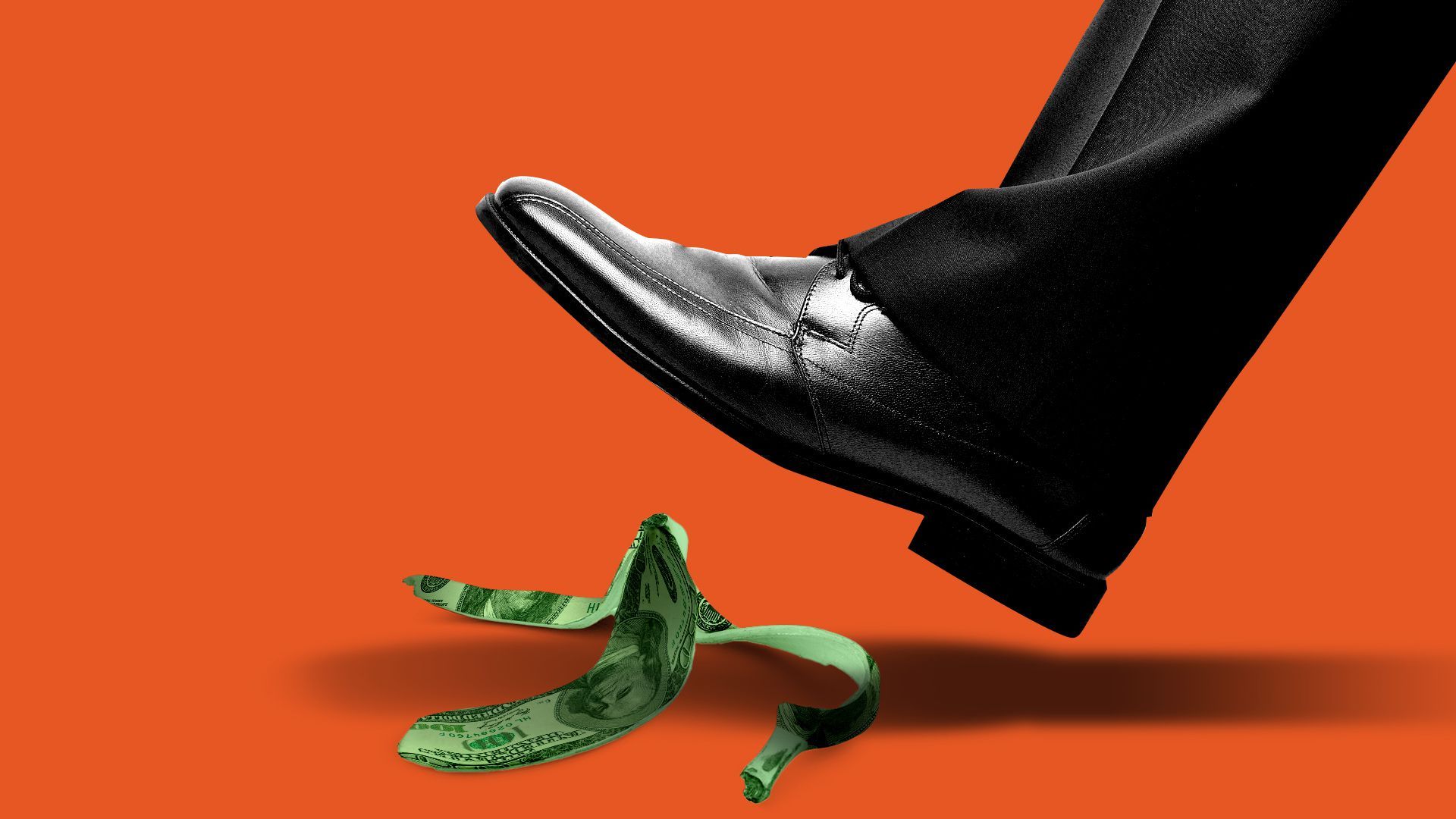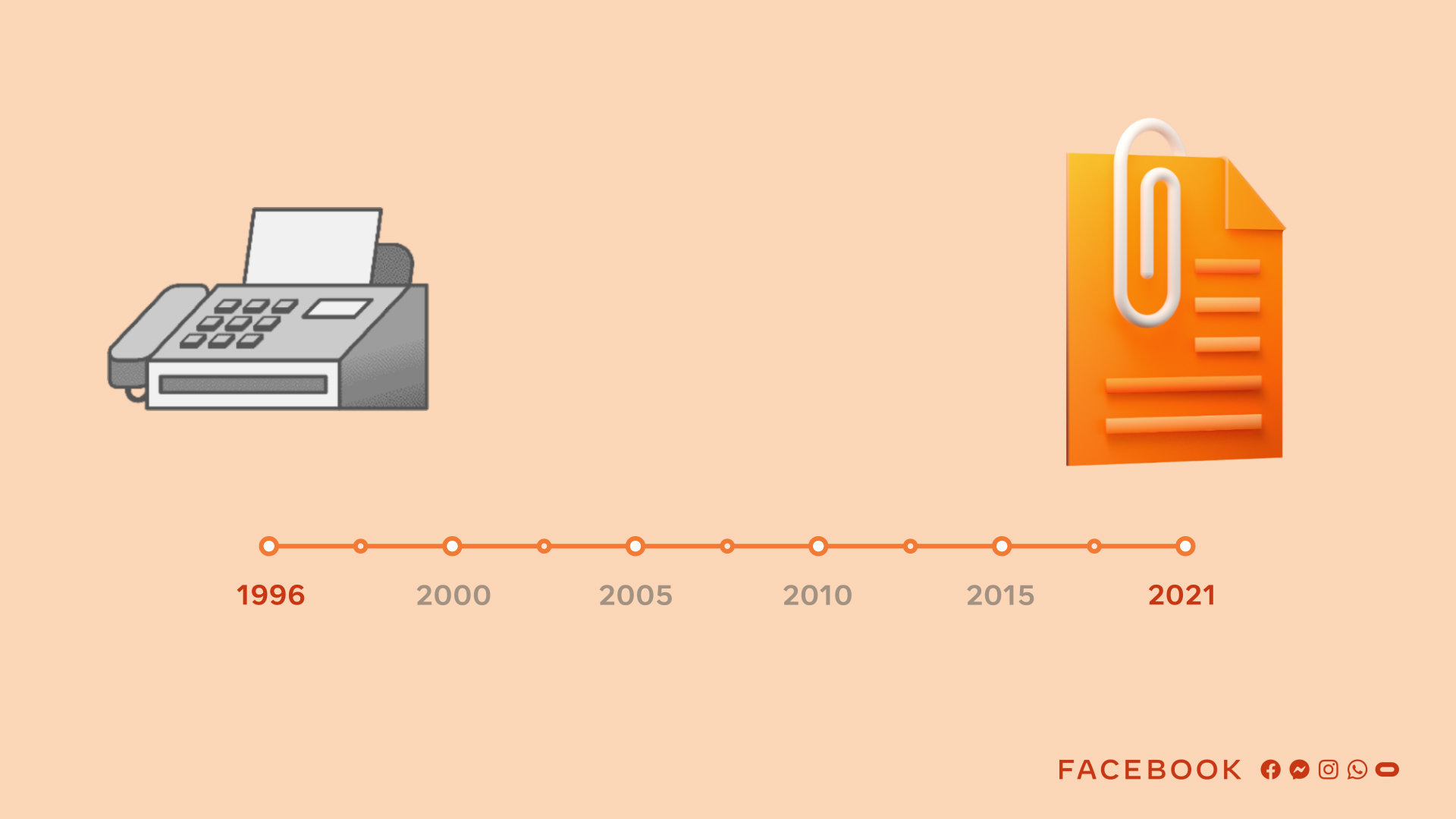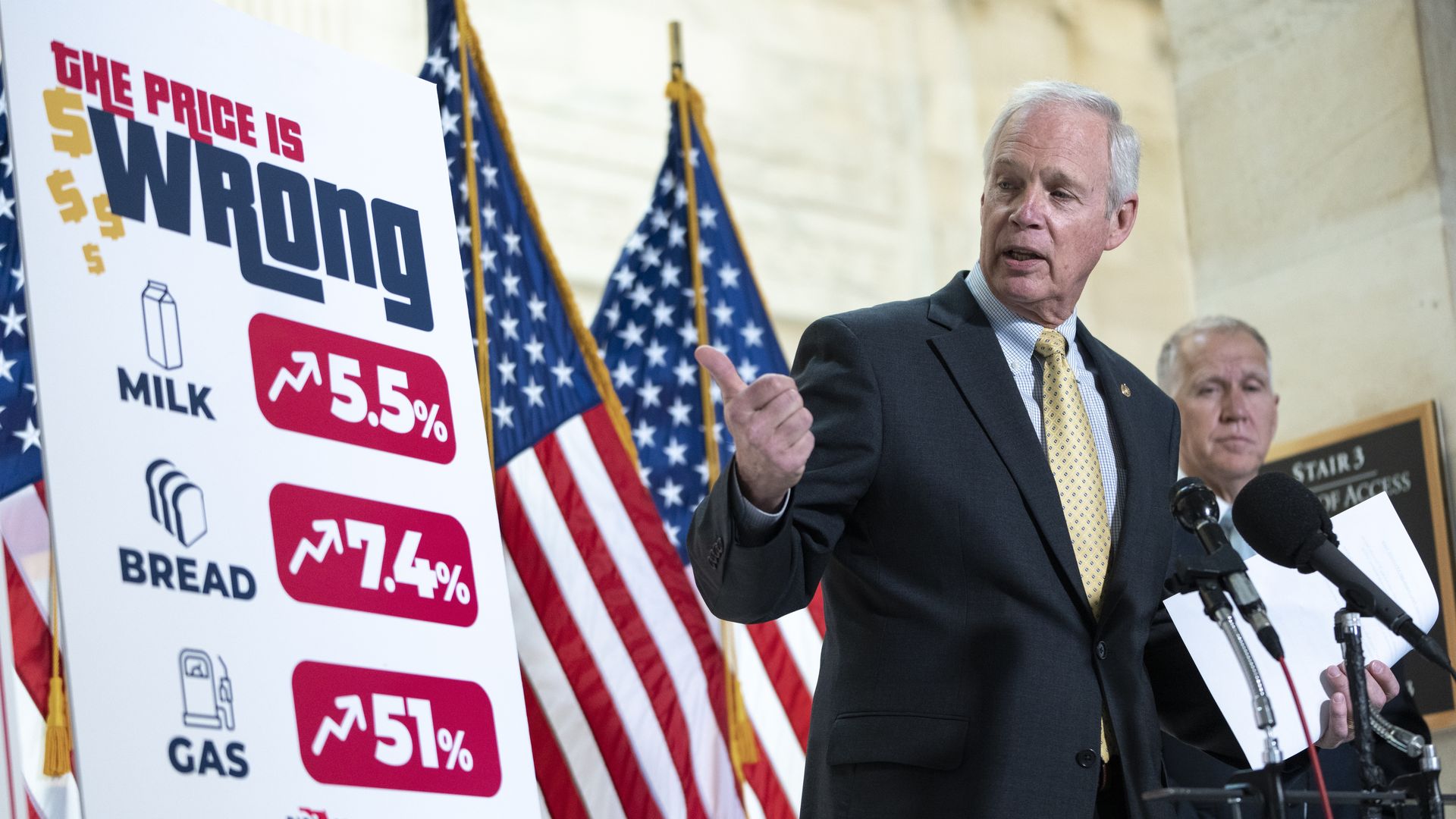| | | | | | | Presented By Facebook | | | | Axios Sneak Peek | | By Alayna Treene and Hans Nichols ·Jun 09, 2021 | | Welcome back to Sneak. The presidential delegation broke free of the cicada swarm. Smart Brevity™ count: 1,251 words ... 4.5 minutes. Edited by Glen Johnson. | | | | | | 1 big thing: 🇬🇧 Biden's European optimism collides with reality |  | | | President Biden departs for the United Kingdom. Photo: Brendan Smialowski/AFP via Getty Images | | | | As President Biden departed Washington today, he told reporters he was going to use his first foreign trip to make "clear to Putin and to China that Europe and the United States are tight and the G7 is gonna move." Why it matters: The problem is his statements regarding the allies' shared objectives are not supported by the statements and actions of the allies themselves, Axios' Jonathan Swan notes. - Biden's optimistic words and their bottom-line deeds will collide during a G7 summit in the U.K., a NATO gathering in Brussels and a meeting with Russian President Vladimir Putin in Geneva.
Between the lines: Two powerful European countries — Germany and France — don't appear to be on board when it comes to presenting a united front against China and Russia. - German Chancellor Angela Merkel wants to strengthen European financial connections with the Chinese. She has been the most prominent European voice advocating for an EU-China investment deal.
- She's also determined to complete and operationalize the Nord Stream 2 natural gas pipeline between Russia and Germany.
- The Germans have made clear to the Biden administration they won't back down on this project, regardless of U.S. pleas or pressure.
Biden all but conceded defeat by waiving sanctions on the company overseeing construction — clearing the way for the pipeline's completion. - Completing the project is a major win for Putin.
- He now has a potent lever to increase his influence in Europe and over vulnerable states such as Poland and Ukraine.
- Each scenario is another means of furthering his efforts to divide NATO.
French President Emmanuel Macron also has made public statements conflicting with Biden's comments. - In February, Macron warned against the idea of the European Union joining the U.S. to confront China.
- "A situation to join all together against China, this is a scenario of the highest possible conflictuality," Macron said. "This one, for me, is counterproductive."
- Macron also has called for European "strategic autonomy" — a phrase that implies a distance between Europe and the U.S.
The bottom line: Biden's meeting with NATO leaders in Brussels is crucial to his plan for reestablishing the Atlantic alliance that former President Trump pilloried and was accused of undermining. - A major goal of the trip is promoting alliance unity on Russia.
- The actions that European leaders have already taken, though, are now speaking louder than any joint statement they ultimately produce in Brussels.
|     | | | | | | 2. The risk in Democrats' generous unemployment benefits |  | | | Illustration: Aïda Amer/Axios | | | | The staff shortfalls Americans are finding as they head to restaurants and summer vacation spots illustrate the risk for Democrats over whether the government's extra $300 per month in enhanced unemployment benefits is to blame, Axios' Alayna Treene reports. Why it matters: Twenty-five states — all run by Republican governors — are eliminating some or all of the UI benefits. Some are even offering back-to-work bonuses to further encourage a return to work. Expect the results to become midterm fodder next year. - "While these federal programs provided important temporary relief, vaccines and jobs are now in good supply," said Maryland Gov. Larry Hogan, a Republican and potential 2024 candidate for president.
- As of now, most Democratic lawmakers argue there are more factors contributing to the staff shortages — notably child care, especially for women, according to several members of Congress who spoke to Axios.
- Yet many Democrats are increasingly willing to admit they may have gotten it wrong, and fear the spike in activity this summer will generate a backlash among their constituents.
Sen. Angus King (I-Maine) said he thinks the states rescinding the extra money will serve as a test case for the two parties. - "I can't deny that it appears to be having a significant impact, particularly on the hospitality industry," King added. "(The enhanced UI) is helping to support the economy. On the other hand, is it impeding job growth? I don't know. We'll have to find out."
Sen. Tim Kaine (D-Va.), former governor of Virginia: "We were trying to basically solve a once-in-a-century health pandemic that completely ravaged the economy. I think we did a very good job at it. Was everything calibrated perfectly? I don't know that I'd say that." - "I'm not questioning decisions that governors are making about it. I think if there's solid evidence that there's a disincentive, then governors may curb back. But I'm not exactly sure that that evidence is strong and uniform everywhere in the country."
Sen. Chris Murphy (D-Conn.): "There are a lot of reasons why some people have been reluctant to come back to work. Not the least of which is ... complicated child care challenges." - "These extended benefits were never supposed to be permanent, and if the economy comes back online, it certainly makes sense to pare them back to normal size."
Keep reading. |     | | | | | | 3. By the numbers: The state dictating national policy |  Data: U.S. Census Bureau; Chart: Axios Visuals Senators representing West Virginia — one of the smallest, whitest and most pro-Trump states in the country — have been holding a Democratic-controlled Senate, House and White House from knocking out big agenda items, Axios' Stef Kight writes. What's happening: Sen. Shelley Moore Capito (R-W.Va.) failed to reach an infrastructure deal with President Biden. And Sen. Joe Manchin (D-W.Va.) has consistently refused to support several of his party's initiatives, such as voting rights legislation. Why it matters: In a representative democracy, lawmakers rightfully represent the interests of their constituents. But the raw demographics of West Virginia differ from those of the rest of the country affected by Capito and Manchin's actions. - The state has experienced the fastest rate of population decline in the nation, according to census data.
- It looks completely different than the rest of the U.S.: 92% of the population is non-Hispanic white, making it the third-whitest state in a rapidly diversifying country.
- It also has the lowest percentage of people with a bachelor's degree or higher, and was the state that had the second-highest margin in favor of Donald Trump in the 2020 election.
|     | | | | | | A message from Facebook | | The internet has changed a lot since 1996 - internet regulations should too | | |  | | | | It's been 25 years since comprehensive internet regulations passed. See why we support updated regulations on key issues, including: - Protecting people's privacy.
- Enabling safe and easy data portability between platforms.
- Preventing election interference.
- Reforming Section 230.
| | | | | | 4. White House confident on economy ahead of CPI report |  | | | Sen. Ron Johnson (R-Wis.) highlights price hikes last month. Photo: Drew Angerer/Getty Images | | | | Ahead of tomorrow's inflation data, the White House is confident the economic recovery will continue, with sources highlighting recent analysis — including from Goldman Sachs — that inflation will remain transitory, Axios' Hans Nichols reports. Why it matters: The monthly release of the Consumer Price Index will add fresh fodder to the debate about whether inflation will be short-term or part of a long-term, and dangerous, cycle. Republican critics are already seizing on the topic. - They argue that President Biden's massive government spending is making everyday items more expensive.
- Over the weekend, Treasury Secretary Janet Yellen suggested, for the first time, inflation could reach 3% on a "year-over-year" basis, though she insisted it would be "transitory."
Driving the news: For a growing number of economists, Yellen's 3% figure may be underestimating the potential risk. And inflation may be higher, some warn. - "After (tomorrow's) number and the July number, we will very likely have already had 3% inflation in 2021," said Larry Summers, a former Treasury secretary and National Economic Council director for President Obama. "Perhaps at that point, policymakers will be appropriately concerned."
- "So far this year, inflation is running at a 6% rate," said Jason Furman, a chair of the Council of Economic Advisers under Obama. "It is likely to moderate ... but likely to be above 3%, and 4% is completely plausible."
Go deeper: Monthly CPI data measure price increases, both on a month-to-month and year-to-year basis. One month's numbers won't settle the debate about the endurance of recent inflation. - For example, in April the cost of an airline ticket rose 10.2%, but that was compared to last April, when virtually no one was flying because of the pandemic lockdown.
The other side: "Higher recent inflation readings in consumer prices are a cause for concern," wrote Glenn Hubbard, former CEA chair under President Bush. - "I am more worried now than I was two months ago," said Doug Holtz-Eakin, the president of the American Action Forum and former director of the Congressional Budget Office. "So far, we haven't seen core inflation move up sharply, but that's coming."
Keep reading. |     | | | | | | 5. Pic du jour |  | | | Photo: Brendan Smialowski/AFP via Getty Images | | | | President Biden hugs Sydney Glascock after the 14-year-old daughter of two service members introduced him to families stationed at the RAF Mildenhall station in Suffolk, England. |     | | | | | | A message from Facebook | | Why Facebook supports updated internet regulations | | |  | | | | 2021 is the 25th anniversary of the Telecommunications Act of 1996, the last major update to internet regulation. It's time for an update to set clear rules for addressing today's toughest challenges. See how we're taking action on key issues and why we support updated internet regulations. | | | | 🎢 We made it through Hump Day; it's all downhill from here! Thanks for reading tonight. |  | | The tool and templates you need for more engaging team updates. | | | | | | Axios thanks our partners for supporting our newsletters. If you're interested in advertising, learn more here.
Sponsorship has no influence on editorial content. Axios, 3100 Clarendon Blvd, Suite 1300, Arlington VA 22201 | | | You received this email because you signed up for newsletters from Axios.
Change your preferences or unsubscribe here. | | | Was this email forwarded to you?
Sign up now to get Axios in your inbox. | | | | Follow Axios on social media:    | | | | | |










No comments:
Post a Comment